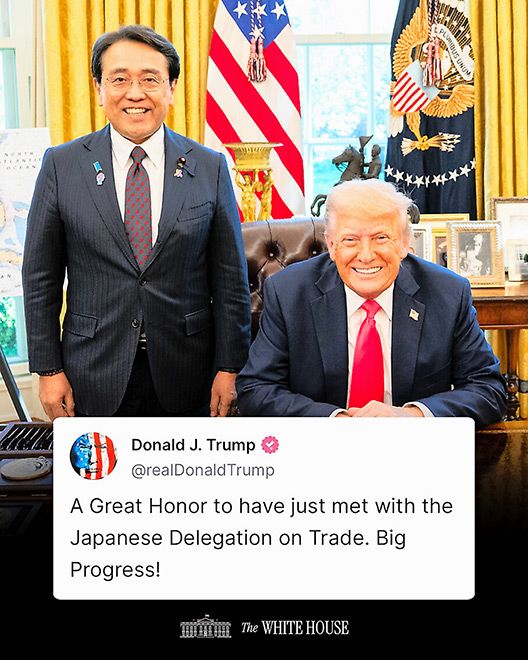U.S. President Donald Trump specifically demanded Tokyo pay more for stationing American troops in Japan, increase sales of U.S. automobiles, and reduce the U.S. trade deficit, several Japanese government sources said.
The demands for improvements in the “three pillars” came in talks at the White House on April 16 with Ryosei Akazawa, Japan’s economic revitalization minister.
In subsequent ministerial-level talks, both Japan and the United States agreed to aim to finalize negotiations on U.S. tariffs at an early date and for Trump and Prime Minister Shigeru Ishiba to make a joint announcement.
The meeting between Trump and Akazawa lasted about 50 minutes, well in excess of the scheduled 30 minutes.
U.S. Treasury Secretary Scott Bessent, U.S. Trade Representative Jamieson Greer and U.S. Commerce Secretary Howard Lutnick were also present at the meeting.
After the meeting, Akazawa told reporters that Trump “gave a frank recognition of the current situation of the United States in the international economy.”
But he declined to mention specifics of the exchange.
According to Japanese government officials, Trump raised security issues in the meeting that Akazawa had believed would be mainly about tariffs. The U.S. president repeated his view that Japan is not bearing a sufficient share of the cost to station U.S. troops in Japan.
Trump also expressed dissatisfaction with the low sales of U.S.-made automobiles in Japan. And he demanded an elimination of the U.S. trade deficit with Japan, which stood at $68.5 billion (about 9.7 trillion yen) in 2024, according to the sources.
Akazawa explained to Trump that the Japanese side pays an average of 200 billion yen annually for U.S. forces in Japan, the sources said.
Regarding Trump’s comment that talks with Japan are a top priority, a senior Foreign Ministry official said, “The aim is (for Japan) to set a successful example for the world as soon as possible.”
Japan was the first country to negotiate directly with the United States following Trump’s 90-day suspension of “reciprocal tariffs” on about 70 nations.
Japanese officials are now focused on the timing of top talks between Ishiba and Trump.
“There is a possibility that Japan-U.S. negotiations will be agreed to well ahead of schedule,” a senior government official said.
Ryo Sahashi, a professor at the Institute for Advanced Studies on Asia at the University of Tokyo who specializes in East Asian security and international relations, said other countries may use the Japan-U.S. talks as a “model case” for their future negotiations with the Trump administration.
“What is clear from the latest negotiation is that the United States wants to get results quickly,” Sahashi said. “For this reason, it chose a country that is relatively easy to work with among its allies as the first for negotiations.”
He said the current situation is an even greater test for the Japan-U.S. alliance than the trade friction between the two countries in the late 1980s.
“The United States under Trump will not only press Japan to increase its cost burden of stationing U.S. troops in Japan, but it could also make unusual demands, such as imposing joint tariffs against China and making further purchases of U.S. Treasury bonds,” Sahashi said.


AloJapan.com